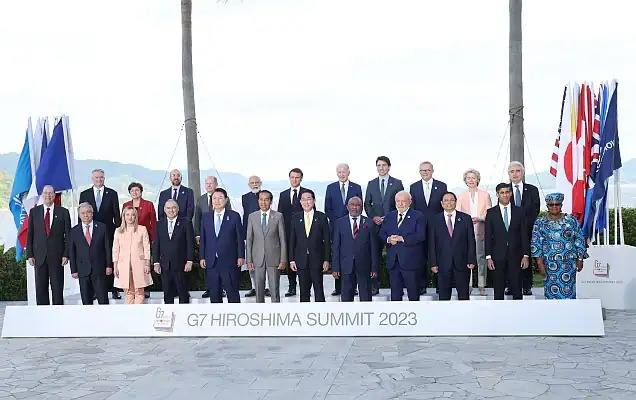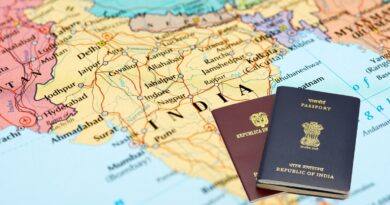Tie India To The West: The Time Is Now!
India’s Geopolitical Shift: The Case for Tying India to the West
India’s geopolitical landscape is undergoing a significant transformation, marked by its increasing engagement with the global south and a simultaneous drive to build stronger ties with the West. While India’s new enthusiasm for the global south should not be mistaken for reduced interest in the West, the centrality of the G-7 for India’s economic and geopolitical prospects continues to grow. As India seeks to effectively deal with the mounting challenges posed by China, cooperation with the G-7 becomes crucial. Furthermore, the West, particularly the United States, also recognises the importance of integrating India into its strategic framework to counter growing Chinese and Russian influence among developing nations.
India’s Dual Orientations
India’s dual orientations, namely its gradual alignment with the West and renewed engagement with the global south, are interconnected and reflect New Delhi’s strategic repositioning against Beijing. The West, too, has a vested interest in a stronger India that can serve as a counterbalance to Chinese and Russian influence in the developing world. The recent offer of advanced technologies by the United States to India, despite differences on issues like Russia’s involvement in Ukraine, underscores Washington’s desire to enhance ties with New Delhi and integrate it into trusted global supply chains.
India’s Role in the G-7
Integrating India, poised to become the world’s third-largest economy, into the G-7 process is a logical next step for the West. The G-7, once primarily focused on aligning economic policies, has evolved into a bloc of leading democracies cooperating on global security and other critical issues, including competition with China and Russia. While some may fear that India’s historical leadership in the Non-Aligned Movement suggests a return to mobilising the global south against the global north, there are few indications to support this notion. In fact, India’s recent Voice of the Global South Summit exhibited little anti-Western rhetoric.
India’s Outreach Strategy
India’s current outreach objective is primarily aimed at reconnecting with a global constituency rather than pure geostrategic manoeuvring. During the Cold War, India had built significant goodwill across the global south, but in recent decades, it has shifted its focus to great-power relations, regional engagement, and joining Asian institutions. However, events such as the devastating impact of the COVID-19 pandemic on the developing world and Russia’s war in Ukraine have provided India with an opportunity to reengage with the global south. India’s growing economy has also enabled New Delhi to contribute more to aid and investment in poorer countries. As India assumes the presidency of the G-20 this year, it presents a major diplomatic opportunity to strengthen its engagement with the global south.
Geopolitical Considerations
India’s concerns about an assertive China have prompted the Modi government to actively seek ways to counterbalance Beijing’s influence in the developing world. While India alone may have limited impact, a closer partnership with the West could pose a significant geopolitical challenge to China—a priority shared by both India and the West. Japan, too, recognises the dangers of China’s deep penetration into the global south and has become an important partner for India. As the only Asian voice in the G-7, Japan can bring nuance to Western policies and help align the group’s approach with India on regional issues.
The India-Japan Partnership
India and Japan have increasingly collaborated in the Indian Ocean region to counter China’s expanding regional influence. India’s participation in the Quadrilateral Security Dialogue (Quad) with Japan, Australia, and the United States is driven by shared security concerns about China. Bilaterally, India’s economic and security cooperation is increasingly oriented towards Western countries, solidifying its ties with Japan and further aligning its interests with the West.
To summarise, India’s geopolitical shift is reshaping its relationships with both the global south and the west. While India’s recent focus on the global south should not be misunderstood as a diminishing interest in the West, its alignment with the West remains crucial for its economic growth, technological advancements, and countering the challenges posed by China.
Recognising the value of a stronger India, the West, particularly the United States, seeks to deepen ties with New Delhi and integrate it into trusted global supply chains. The G-7, once primarily an economic forum, has evolved into a platform for leading democracies to cooperate on global security and address key challenges posed by China and Russia. India’s integration into the G-7 process would be a logical step given its status as the world’s third-largest economy.
India’s outreach strategy is not solely driven by geostrategic considerations but also by the need to reconnect with its historical allies in the global south. The COVID-19 pandemic and Russia’s war in Ukraine have provided India with an opportunity to reengage and leverage its growing economic influence to aid and invest in poorer countries. India’s presidency of the G-20 further enhances its diplomatic opportunities to strengthen ties with the global south.
Geopolitically, India’s concerns about China’s influence in the developing world have prompted the Modi government to seek partnerships with the West. While India alone may have limited impact, aligning with the West can pose a significant challenge to China’s ambitions, which is a shared priority for both India and the West. Japan, in particular, has emerged as a valuable partner for India, given its own concerns about China’s deep penetration in the global south. Japan’s role as the only Asian voice in the G-7 allows it to bring nuance to Western policies and foster greater alignment with India on regional issues.
The India-Japan partnership has witnessed increasing collaboration, especially in countering China’s regional influence in the Indian Ocean. India’s participation in the Quad, alongside Japan, Australia, and the United States, demonstrates shared security concerns and a desire to maintain a rules-based order in the Indo-Pacific region. Bilateral cooperation between India and Japan further strengthens ties with the West and consolidates India’s interests in aligning with Western countries.
India’s geopolitical shift encompasses both its engagement with the global south and its pursuit of stronger ties with the West. The West recognises the importance of integrating India into its strategic framework to counter growing Chinese and Russian influence. Simultaneously, India’s outreach to the global south aims to reconnect with historical allies and leverage its economic influence for development cooperation. By aligning with the West, particularly through its partnership with Japan, India can present a formidable challenge to China’s ambitions while also benefiting from increased economic growth, technology transfers, and global influence.





